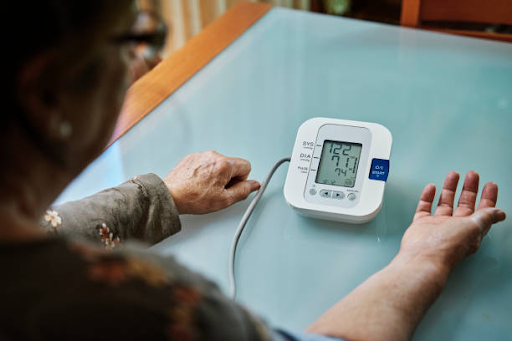
High blood pressure, or hypertension, is a common health condition that can lead to serious health problems if left untreated. Heart disease is the leading cause of death worldwide, and high blood pressure is a significant risk factor for developing heart disease. Regular blood pressure monitoring is crucial for maintaining good heart health and preventing heart disease. This article will explore the importance of regular blood pressure monitoring and how it can help prevent heart disease.
What is Blood Pressure?
Blood pressure is the force of blood against the walls of your arteries as your heart pumps it through your body. It is measured using two numbers, systolic pressure, and diastolic pressure. Systolic pressure is the top number and measures the pressure in your arteries when your heart beats. In contrast, diastolic pressure is the bottom number and measures the pressure in your arteries between heartbeats when your heart is resting.
The Link between High Blood Pressure and Heart Disease
High blood pressure is a significant risk factor for developing heart disease, including heart attacks, strokes, and heart failure. When your blood pressure is too high, your heart must work harder to pump blood. Over time, this can cause damage to your arteries, which can lead to atherosclerosis (hardening and narrowing of the arteries) and increase the risk of heart disease.
Why Regular Blood Pressure Monitoring is Important
Regular blood pressure monitoring is important for maintaining good heart health and preventing heart disease. Monitoring your blood pressure can help you identify any changes in your blood pressure that could be a sign of an underlying health condition. If your blood pressure is consistently high, your doctor may recommend lifestyle changes, such as eating a healthy diet, exercising regularly, and reducing stress. If lifestyle changes are insufficient, your doctor may prescribe medication to help lower your blood pressure.
Who Should Monitor Their Blood Pressure?
Everyone should monitor their blood pressure regularly, especially if they have a family history of high blood pressure or heart disease, are overweight or obese, have diabetes, smoke, or have other risk factors for heart disease. These individuals should take extra care to monitor their blood pressure regularly to help identify any changes that could lead to serious health problems. By staying vigilant and managing their blood pressure, those at risk can greatly reduce their chances of developing heart disease and related complications.
How to Monitor Your Blood Pressure
Monitoring your blood pressure is easy and can be done at home using a blood pressure monitor. Blood pressure monitors are available over the counter at most drug stores and online. We highly recommend connecting with Melbourne Heart Care if you need a cardiologist. They specialize in comprehensive cardiac care and have a team of experienced cardiologists dedicated to delivering the highest quality of care to their patients, from diagnosis to treatment and ongoing management.
Tips for Accurate Blood Pressure Monitoring
To ensure the accuracy of your blood pressure readings, follow these tips:
- Sit quietly for 5 minutes before taking your blood pressure.
- Use the correct cuff size for your arm.
- Take two or three readings, one minute apart, and record the average.

What to Do If You Have High Blood Pressure
High blood pressure, or hypertension, is a common medical condition that can lead to serious health problems if left untreated. If you have high blood pressure, here are some steps you can take to manage it:
Get regular check-ups
Make sure to see your doctor regularly to monitor your blood pressure and discuss any concerns you may have.
Maintain a healthy weight.
If you are overweight or obese, losing weight can help reduce your blood pressure. Aim for a body mass index (BMI) between 18.5 and 24.9.
Exercise regularly
Regular physical activity can help lower your blood pressure. Aim for at least 30 minutes of moderate-intensity exercise, such as brisk walking, most days of the week.
Eat a healthy diet
Eat a diet low in sodium, saturated fat, and cholesterol. Include plenty of fruits, vegetables, whole grains, and lean protein sources.
Limit alcohol and quit smoking.
If you drink alcohol, limit your consumption to no more than one drink per day for women and two drinks per day for men. Quit smoking if you are a smoker.
Manage stress
Stress can contribute to high blood pressure. Find healthy stress management methods like relaxation techniques, meditation, or yoga.
Take medication as prescribed.
If your doctor prescribes medication to lower your blood pressure, take it exactly as prescribed.
Following these steps can help manage your high blood pressure and reduce your risk of developing serious health problems such as heart disease, stroke, and kidney disease.
Final Thoughts
Regular blood pressure monitor in Melbourne is critical to preventing heart disease. High blood pressure is a significant risk factor for developing heart disease, and monitoring your blood pressure can help you identify any changes that could indicate an underlying health condition.
It is important to follow accurate monitoring techniques and take necessary steps such as maintaining a healthy weight, regularly exercising, eating a healthy diet, limiting alcohol, quitting smoking, managing stress, and taking medication as prescribed.
By doing so, you can manage your high blood pressure and reduce your risk of developing serious health problems like heart disease, stroke, and kidney disease. Everyone needs to monitor their blood pressure regularly, especially if they have risk factors for heart disease.
Interesting Related Article: “What Makes High Blood Pressure More Likely?“

